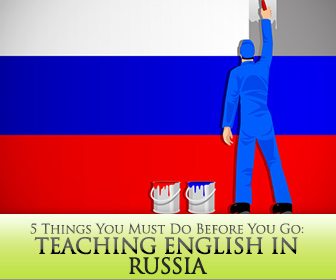Teaching English in Russia: 8 Things You'll Wish You'd Done Before You Went


None of them is exceptionally difficult but get them done well in advance, to allow for delays on either side of the bureaucratic curtain.

It sounds obvious, but check that your passport is up to date – expiring at least a year or so after your trip – and renew it if necessary. If you leave it till the last minute, or last weeks, you’ll have to pay a hefty surcharge. If you don’t have a passport at all, getting one can take a while as you collect all the other documents required to prove your identity and the issuers check through them. While you’re at it, locate the Russian consulate in your own country and confirm current visa requirements.
In some countries, you can just turn up and find a job once you get there, as long as you have sufficient funds to keep you going for a while. Russia is not one of these countries and you could end up in a lot of trouble if you try doing this on a tourist visa. It is also not a place where you can build up a self-employed business with private students, at least not until you know the country well and have all the necessary paperwork and, possibly, residency. While breaking immigration laws is not recommended anywhere, I’d say Russia is one of those where that would be a really bad idea.
This means it is absolutely essential to find a job long before you actually go. Start applying to schools several months before you intend to start. Once you’ve been offered a job of the sort you’d like, the school will provide some of the essential paperwork and can advise you on the general process.
Bear in mind though, that it might vary by country and might have changed since whoever you speak to went through the same process. Somebody who moved from the UK to Russia 10 years ago won’t have the most up to date information and it might not have ever been accurate for somebody from Canada or the USA.
You’ll almost certainly need a letter of invitation and proof of accommodation, although these are things to check. Tourists usually get these from hotels, but you’ll need to ask the school for such things, along with proof of employment and anything else currently required by the Russian immigration services - requirements change regularly. Allow plenty of time for anything that must be posted to arrive.
When I was in Russia, getting a test for HIV was mandatory (you had to be negative) before going, something which a surprisingly large number of countries require. Although getting the results for an HIV test, and any others that might be required, doesn’t take long, less than a week even if you don’t opt for an expensive rush job, allow yourself a bit of time. The problem here is that if you get a lot of HIV tests, even if they are just for travel, health insurance companies might increase their premiums on the, in this case completely inaccurate, basis that the tests are a sign of risky behaviour.
This wasn’t a concern for me, since I’m based in the UK and don’t need or have private medical insurance, but is worth considering if you do have to pay insurance premiums. Ways to ensure that numerous HIV tests don’t increase your costs exist, but if you always get such tests in a rush at the last minute, you might not be able to sort it out with your insurance company.
On another note entirely, you don’t actually need any vaccinations for going to Russia but there are a few it would be advisable to arrange, especially if you plan to spend a lot of time travelling in remote areas of the country, participating in adventure sports or interacting with animals, wild or domestic. Sensible precautions include getting a vaccination for hepatitis A and checking your tetanus is up to date. If you are planning to spend much time in the wilds, consider shots for Japanese encephalitis and rabies as well, although this is something to discuss with your doctor.
The final thing to arrange is a work visa, not a tourist one, which you do through the Russian consulate in your country. The consulate will probably be located in the capital and you’ll almost certainly need to go in person, so if this is not where you’re based, allow time for at least one and possibly more day trips.
You’ll need all the above paperwork, including your passport. I’d suggest allowing at least a month of extra time to sort paperwork beyond what you estimate you need. In unusual circumstances, things might be delayed even further, although your school will probably be willing to change your start date.
Something similar applies to booking flights – have a buffer zone. Ideally, wait until you’ve got everything you need and aim to arrive at least a few days before you actually start work – you’ll need a bit of time just to settle in and get any on-site paperwork sorted.
While you’re doing all these unexciting tasks, don’t abandon your email. Keeping in touch with the school intermittently, even when you don’t need their assistance (rather than disappearing as soon as you get your documents and turning up on the doorstep five months later) is a sensible idea, not to mention polite. Sometimes teachers change their plans without telling anybody, leaving their intended employer in the lurch, so let your school know where you’re up to. Apart from anything else, it ensures they won’t go looking for a replacement.